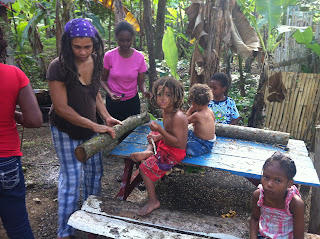 |
Yerba Buena Farmer Owner, Agape Adams, inoculates
one of the selected logs with shiitake mushroom spawn. |
From March 10th-24th, 2012, Nicholas Laskovski from Dana Forest Farm in Waitsfield, Vermont, shared his skill in shiitake mushroom production with local farmers at Yerba Buena Farm in Robins Bay, St. Mary, Jamaica. Over the course of his 2-week assignment, Mr. Laskovski helped identify locally-abundant tree species that fit the rough criteria for growing shiitake mushrooms, cut 100 logs from these trees, and led two hands-on trainings for interested farmers. The trainings covered topics including the life cycle of mushrooms and the needs at each stage, what makes a good tree selection, and inoculation.
By the end of the assignment, Mr. Laskovski and training participants inoculated 100 logs with shiitake mushroom spawn.
Yerba Buena Farm Owner, Agape Adams, explained why mushroom growing has grabbed the attention of local Jamaican farmers:
 |
Nick Laskovski works with local youth to prepare logs
for inoculation. |
“Shiitake and oyster mushrooms are imported and sold locally, mostly to businesses catering to tourists. These mushrooms, however, can easily be grown outdoors on logs. Jamaican farmers in the Robins Bay area have much of their land in mature fruit trees, which are only productive during their season. By adding mushroom growing to their farms’ activities, these farmers make the space under their fruit trees useful. Too shady for vegetables or bananas, this space is perfect for inoculated mushroom logs.
When people clean out their land, they are left with logs that are too small for board, and most often, are burned as firewood or left to rot. This size log, around 4 inches in diameter, is the perfect size for growing mushrooms.
Because the market is already there, the price for mushrooms is high, the logs needed are in abundant supply, the tools are not complicated or terribly expensive, and the skill is easy enough to learn, farmers are attracted to mushroom growing.”
 |
Yerba Buena Farm Owner, Kwao Adams, with 1 of 100
logs used in the assignment. |
Over the course of the following months, the training participants will document changes in the inoculated logs to identify which tree species are best for growing mushrooms. Once the logs are fruiting (6-12 months after inoculation), Yerba Buena Farm plans to host additional workshops to allow participants to taste the mushrooms and discuss pricing and marketing strategies. Ultimately, these farmers hope to form a cooperative of mushroom producers to compete with imported products.




.png)

Comments
Post a Comment